Reflective Essay: Importance of Therapeutic Relationships in Nursing
VerifiedAdded on 2023/04/21
|7
|1366
|361
Essay
AI Summary
This reflective essay delves into the critical role of therapeutic relationships in nursing practice. It emphasizes the significance of these relationships not only with patients and their families but also among care providers, fostering mutual respect and effective teamwork. The essay explores challenges nurses face, such as difficult patient behaviors, ethical dilemmas, and the impact of stigma and bias, particularly in culturally diverse settings. It highlights the importance of communication, personal and professional values (compassion, empathy, and justice), and lifelong learning in maintaining professional integrity and resilience. The essay also discusses the interplay of personal and professional values in enabling therapeutic relationships and the role of peer interaction in supporting nurses. The essay concludes by reiterating the importance of therapeutic interactions in helping healthcare providers excel in this challenging yet rewarding profession.
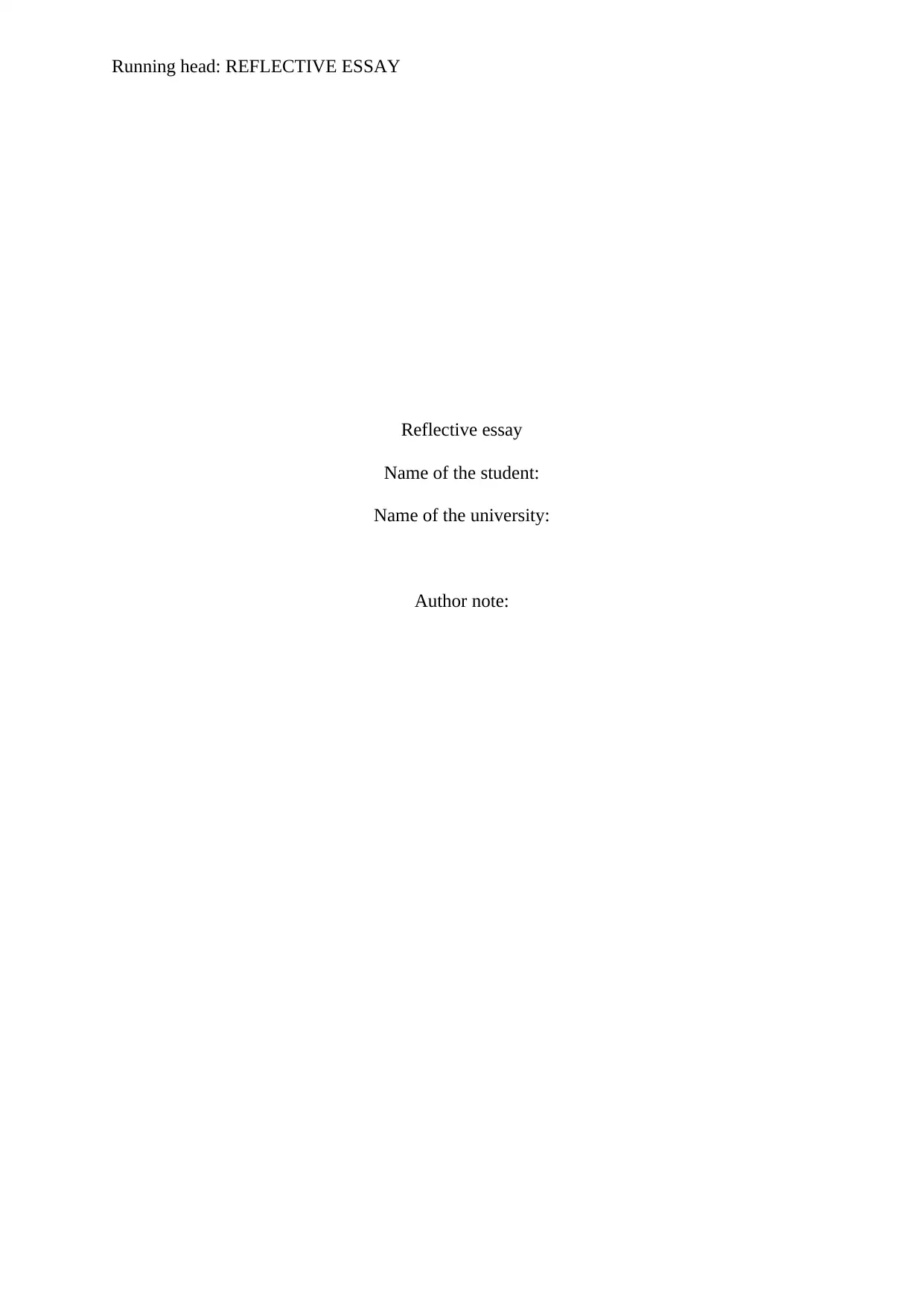
Running head: REFLECTIVE ESSAY
Reflective essay
Name of the student:
Name of the university:
Author note:
Reflective essay
Name of the student:
Name of the university:
Author note:
Paraphrase This Document
Need a fresh take? Get an instant paraphrase of this document with our AI Paraphraser
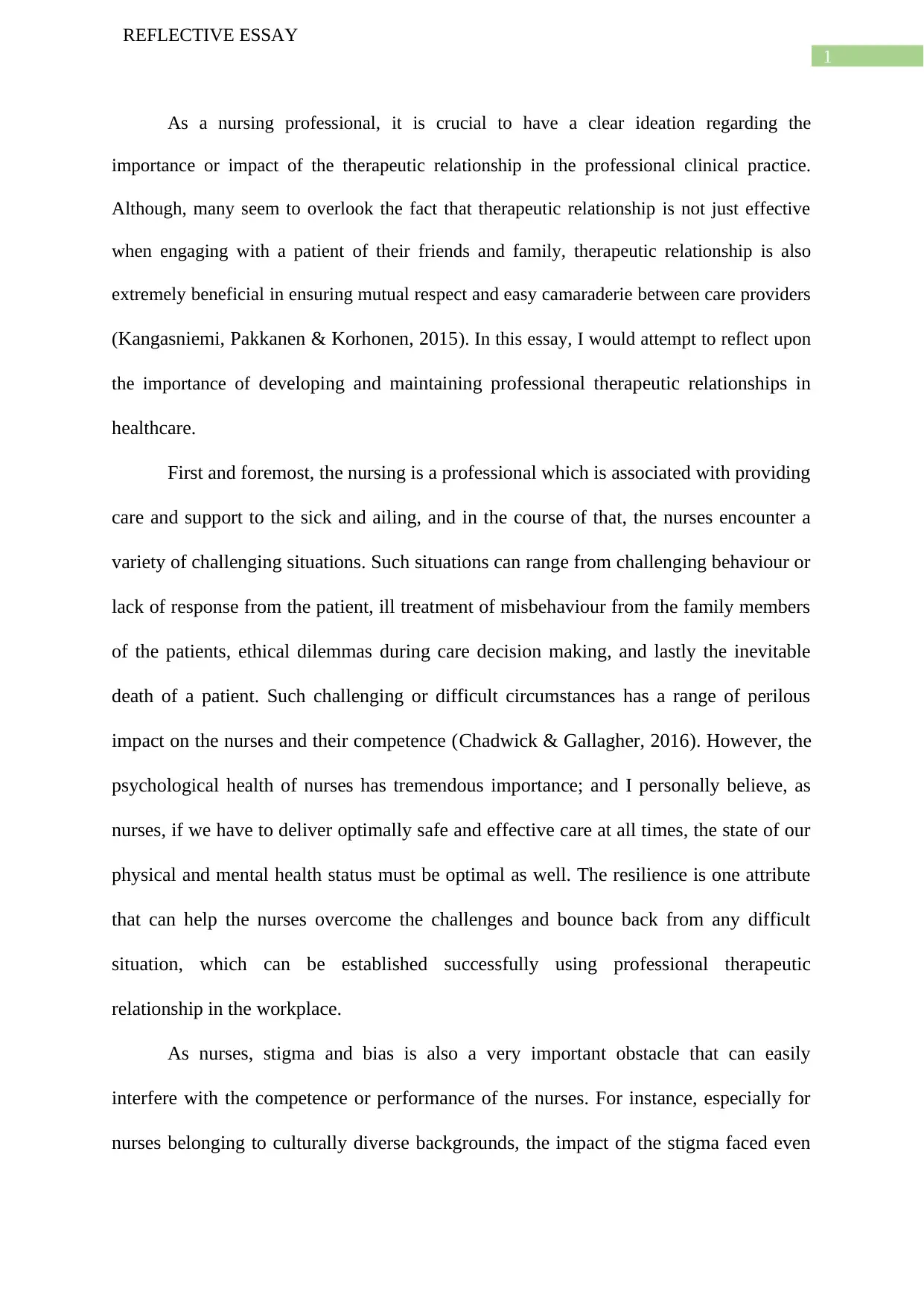
1
REFLECTIVE ESSAY
As a nursing professional, it is crucial to have a clear ideation regarding the
importance or impact of the therapeutic relationship in the professional clinical practice.
Although, many seem to overlook the fact that therapeutic relationship is not just effective
when engaging with a patient of their friends and family, therapeutic relationship is also
extremely beneficial in ensuring mutual respect and easy camaraderie between care providers
(Kangasniemi, Pakkanen & Korhonen, 2015). In this essay, I would attempt to reflect upon
the importance of developing and maintaining professional therapeutic relationships in
healthcare.
First and foremost, the nursing is a professional which is associated with providing
care and support to the sick and ailing, and in the course of that, the nurses encounter a
variety of challenging situations. Such situations can range from challenging behaviour or
lack of response from the patient, ill treatment of misbehaviour from the family members
of the patients, ethical dilemmas during care decision making, and lastly the inevitable
death of a patient. Such challenging or difficult circumstances has a range of perilous
impact on the nurses and their competence (Chadwick & Gallagher, 2016). However, the
psychological health of nurses has tremendous importance; and I personally believe, as
nurses, if we have to deliver optimally safe and effective care at all times, the state of our
physical and mental health status must be optimal as well. The resilience is one attribute
that can help the nurses overcome the challenges and bounce back from any difficult
situation, which can be established successfully using professional therapeutic
relationship in the workplace.
As nurses, stigma and bias is also a very important obstacle that can easily
interfere with the competence or performance of the nurses. For instance, especially for
nurses belonging to culturally diverse backgrounds, the impact of the stigma faced even
REFLECTIVE ESSAY
As a nursing professional, it is crucial to have a clear ideation regarding the
importance or impact of the therapeutic relationship in the professional clinical practice.
Although, many seem to overlook the fact that therapeutic relationship is not just effective
when engaging with a patient of their friends and family, therapeutic relationship is also
extremely beneficial in ensuring mutual respect and easy camaraderie between care providers
(Kangasniemi, Pakkanen & Korhonen, 2015). In this essay, I would attempt to reflect upon
the importance of developing and maintaining professional therapeutic relationships in
healthcare.
First and foremost, the nursing is a professional which is associated with providing
care and support to the sick and ailing, and in the course of that, the nurses encounter a
variety of challenging situations. Such situations can range from challenging behaviour or
lack of response from the patient, ill treatment of misbehaviour from the family members
of the patients, ethical dilemmas during care decision making, and lastly the inevitable
death of a patient. Such challenging or difficult circumstances has a range of perilous
impact on the nurses and their competence (Chadwick & Gallagher, 2016). However, the
psychological health of nurses has tremendous importance; and I personally believe, as
nurses, if we have to deliver optimally safe and effective care at all times, the state of our
physical and mental health status must be optimal as well. The resilience is one attribute
that can help the nurses overcome the challenges and bounce back from any difficult
situation, which can be established successfully using professional therapeutic
relationship in the workplace.
As nurses, stigma and bias is also a very important obstacle that can easily
interfere with the competence or performance of the nurses. For instance, especially for
nurses belonging to culturally diverse backgrounds, the impact of the stigma faced even
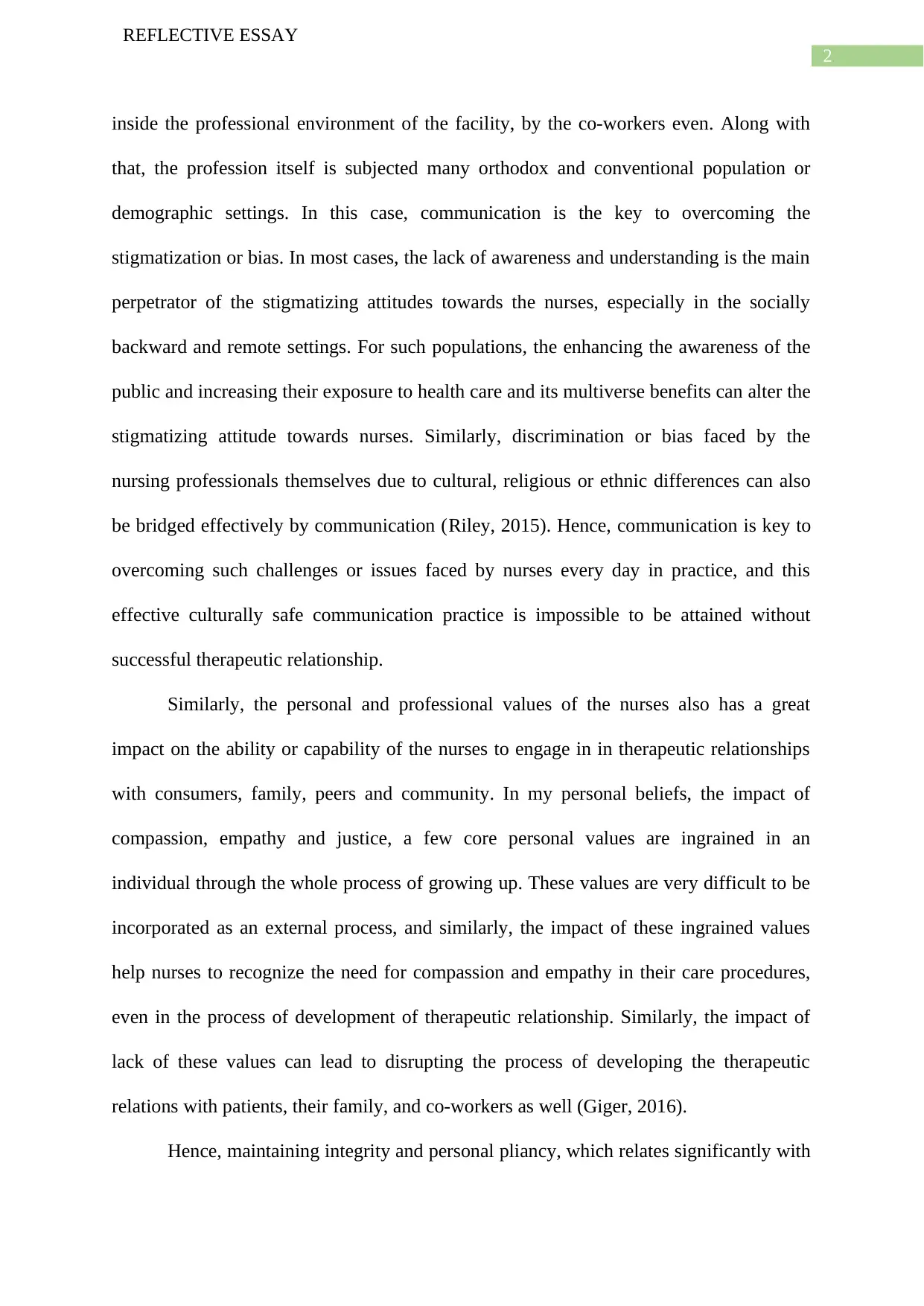
2
REFLECTIVE ESSAY
inside the professional environment of the facility, by the co-workers even. Along with
that, the profession itself is subjected many orthodox and conventional population or
demographic settings. In this case, communication is the key to overcoming the
stigmatization or bias. In most cases, the lack of awareness and understanding is the main
perpetrator of the stigmatizing attitudes towards the nurses, especially in the socially
backward and remote settings. For such populations, the enhancing the awareness of the
public and increasing their exposure to health care and its multiverse benefits can alter the
stigmatizing attitude towards nurses. Similarly, discrimination or bias faced by the
nursing professionals themselves due to cultural, religious or ethnic differences can also
be bridged effectively by communication (Riley, 2015). Hence, communication is key to
overcoming such challenges or issues faced by nurses every day in practice, and this
effective culturally safe communication practice is impossible to be attained without
successful therapeutic relationship.
Similarly, the personal and professional values of the nurses also has a great
impact on the ability or capability of the nurses to engage in in therapeutic relationships
with consumers, family, peers and community. In my personal beliefs, the impact of
compassion, empathy and justice, a few core personal values are ingrained in an
individual through the whole process of growing up. These values are very difficult to be
incorporated as an external process, and similarly, the impact of these ingrained values
help nurses to recognize the need for compassion and empathy in their care procedures,
even in the process of development of therapeutic relationship. Similarly, the impact of
lack of these values can lead to disrupting the process of developing the therapeutic
relations with patients, their family, and co-workers as well (Giger, 2016).
Hence, maintaining integrity and personal pliancy, which relates significantly with
REFLECTIVE ESSAY
inside the professional environment of the facility, by the co-workers even. Along with
that, the profession itself is subjected many orthodox and conventional population or
demographic settings. In this case, communication is the key to overcoming the
stigmatization or bias. In most cases, the lack of awareness and understanding is the main
perpetrator of the stigmatizing attitudes towards the nurses, especially in the socially
backward and remote settings. For such populations, the enhancing the awareness of the
public and increasing their exposure to health care and its multiverse benefits can alter the
stigmatizing attitude towards nurses. Similarly, discrimination or bias faced by the
nursing professionals themselves due to cultural, religious or ethnic differences can also
be bridged effectively by communication (Riley, 2015). Hence, communication is key to
overcoming such challenges or issues faced by nurses every day in practice, and this
effective culturally safe communication practice is impossible to be attained without
successful therapeutic relationship.
Similarly, the personal and professional values of the nurses also has a great
impact on the ability or capability of the nurses to engage in in therapeutic relationships
with consumers, family, peers and community. In my personal beliefs, the impact of
compassion, empathy and justice, a few core personal values are ingrained in an
individual through the whole process of growing up. These values are very difficult to be
incorporated as an external process, and similarly, the impact of these ingrained values
help nurses to recognize the need for compassion and empathy in their care procedures,
even in the process of development of therapeutic relationship. Similarly, the impact of
lack of these values can lead to disrupting the process of developing the therapeutic
relations with patients, their family, and co-workers as well (Giger, 2016).
Hence, maintaining integrity and personal pliancy, which relates significantly with
⊘ This is a preview!⊘
Do you want full access?
Subscribe today to unlock all pages.

Trusted by 1+ million students worldwide
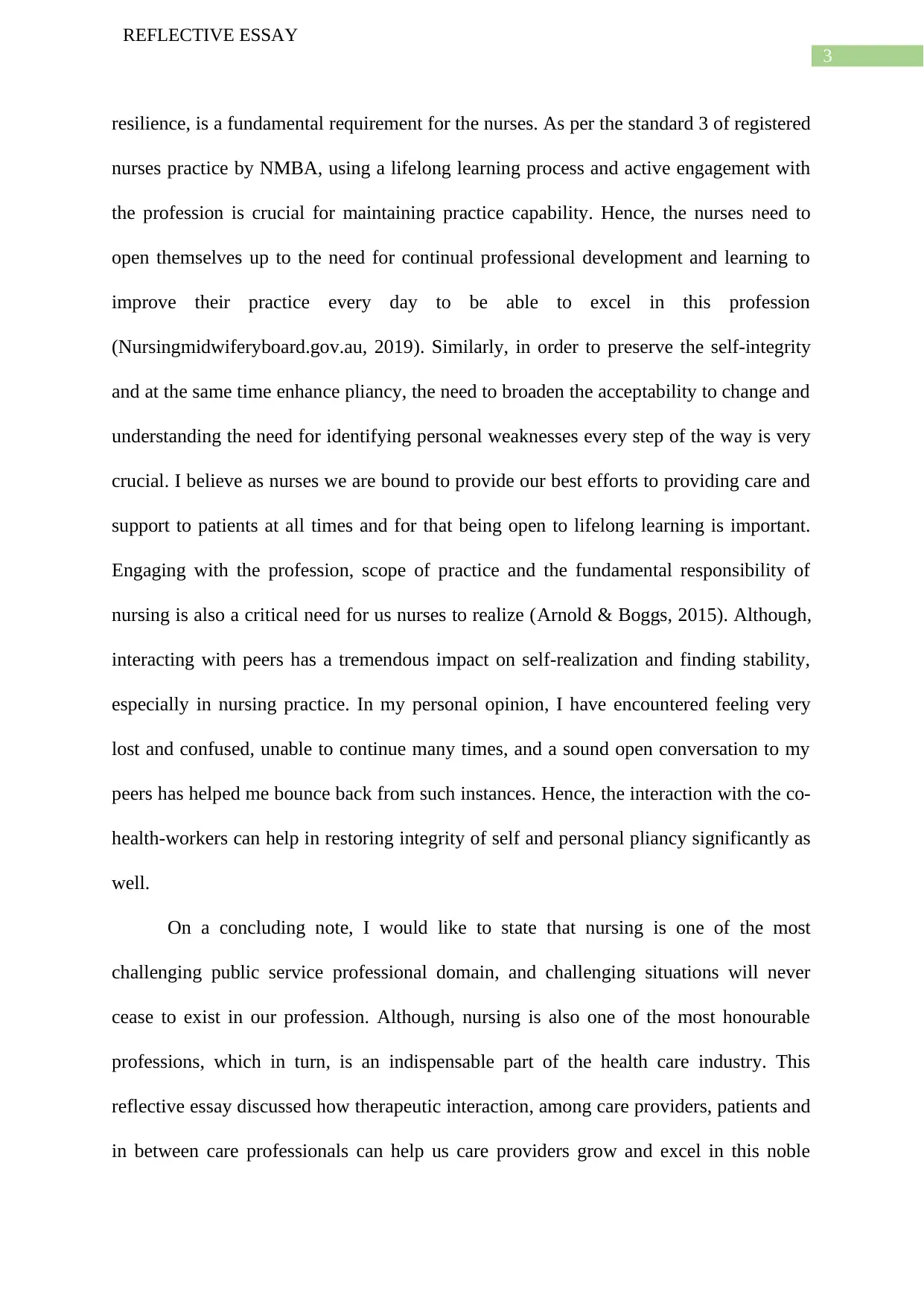
3
REFLECTIVE ESSAY
resilience, is a fundamental requirement for the nurses. As per the standard 3 of registered
nurses practice by NMBA, using a lifelong learning process and active engagement with
the profession is crucial for maintaining practice capability. Hence, the nurses need to
open themselves up to the need for continual professional development and learning to
improve their practice every day to be able to excel in this profession
(Nursingmidwiferyboard.gov.au, 2019). Similarly, in order to preserve the self-integrity
and at the same time enhance pliancy, the need to broaden the acceptability to change and
understanding the need for identifying personal weaknesses every step of the way is very
crucial. I believe as nurses we are bound to provide our best efforts to providing care and
support to patients at all times and for that being open to lifelong learning is important.
Engaging with the profession, scope of practice and the fundamental responsibility of
nursing is also a critical need for us nurses to realize (Arnold & Boggs, 2015). Although,
interacting with peers has a tremendous impact on self-realization and finding stability,
especially in nursing practice. In my personal opinion, I have encountered feeling very
lost and confused, unable to continue many times, and a sound open conversation to my
peers has helped me bounce back from such instances. Hence, the interaction with the co-
health-workers can help in restoring integrity of self and personal pliancy significantly as
well.
On a concluding note, I would like to state that nursing is one of the most
challenging public service professional domain, and challenging situations will never
cease to exist in our profession. Although, nursing is also one of the most honourable
professions, which in turn, is an indispensable part of the health care industry. This
reflective essay discussed how therapeutic interaction, among care providers, patients and
in between care professionals can help us care providers grow and excel in this noble
REFLECTIVE ESSAY
resilience, is a fundamental requirement for the nurses. As per the standard 3 of registered
nurses practice by NMBA, using a lifelong learning process and active engagement with
the profession is crucial for maintaining practice capability. Hence, the nurses need to
open themselves up to the need for continual professional development and learning to
improve their practice every day to be able to excel in this profession
(Nursingmidwiferyboard.gov.au, 2019). Similarly, in order to preserve the self-integrity
and at the same time enhance pliancy, the need to broaden the acceptability to change and
understanding the need for identifying personal weaknesses every step of the way is very
crucial. I believe as nurses we are bound to provide our best efforts to providing care and
support to patients at all times and for that being open to lifelong learning is important.
Engaging with the profession, scope of practice and the fundamental responsibility of
nursing is also a critical need for us nurses to realize (Arnold & Boggs, 2015). Although,
interacting with peers has a tremendous impact on self-realization and finding stability,
especially in nursing practice. In my personal opinion, I have encountered feeling very
lost and confused, unable to continue many times, and a sound open conversation to my
peers has helped me bounce back from such instances. Hence, the interaction with the co-
health-workers can help in restoring integrity of self and personal pliancy significantly as
well.
On a concluding note, I would like to state that nursing is one of the most
challenging public service professional domain, and challenging situations will never
cease to exist in our profession. Although, nursing is also one of the most honourable
professions, which in turn, is an indispensable part of the health care industry. This
reflective essay discussed how therapeutic interaction, among care providers, patients and
in between care professionals can help us care providers grow and excel in this noble
Paraphrase This Document
Need a fresh take? Get an instant paraphrase of this document with our AI Paraphraser
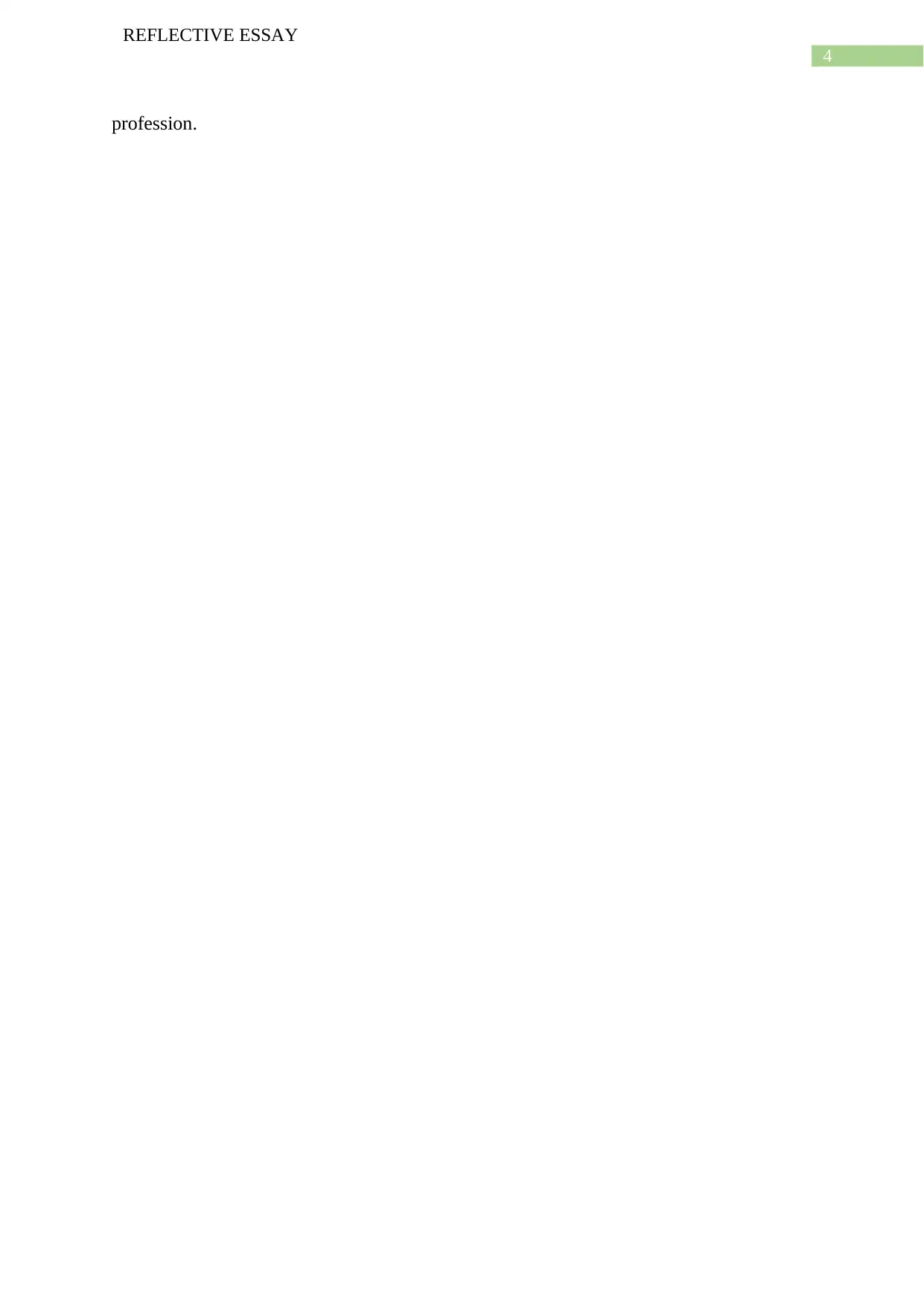
4
REFLECTIVE ESSAY
profession.
REFLECTIVE ESSAY
profession.
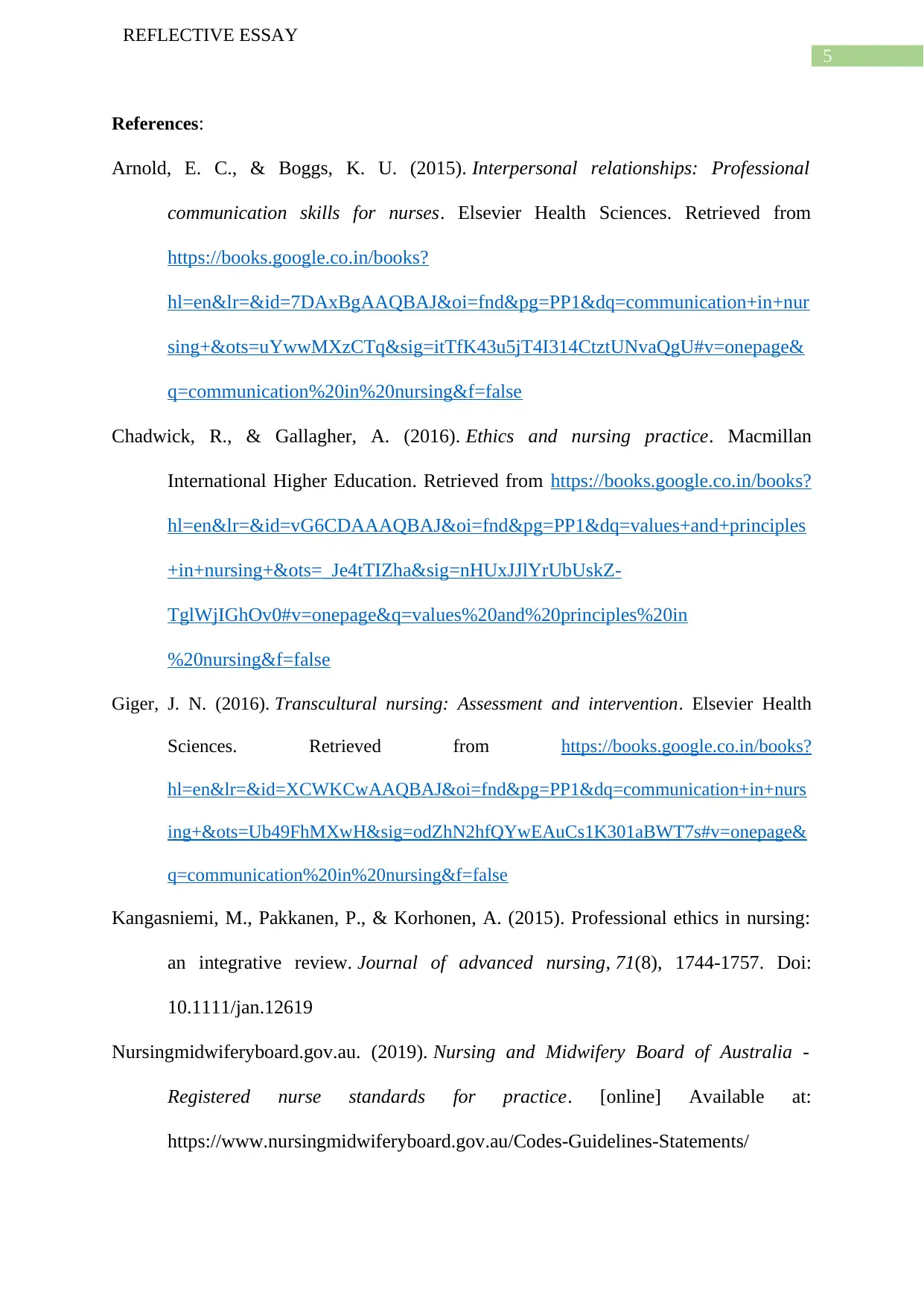
5
REFLECTIVE ESSAY
References:
Arnold, E. C., & Boggs, K. U. (2015). Interpersonal relationships: Professional
communication skills for nurses. Elsevier Health Sciences. Retrieved from
https://books.google.co.in/books?
hl=en&lr=&id=7DAxBgAAQBAJ&oi=fnd&pg=PP1&dq=communication+in+nur
sing+&ots=uYwwMXzCTq&sig=itTfK43u5jT4I314CtztUNvaQgU#v=onepage&
q=communication%20in%20nursing&f=false
Chadwick, R., & Gallagher, A. (2016). Ethics and nursing practice. Macmillan
International Higher Education. Retrieved from https://books.google.co.in/books?
hl=en&lr=&id=vG6CDAAAQBAJ&oi=fnd&pg=PP1&dq=values+and+principles
+in+nursing+&ots=_Je4tTIZha&sig=nHUxJJlYrUbUskZ-
TglWjIGhOv0#v=onepage&q=values%20and%20principles%20in
%20nursing&f=false
Giger, J. N. (2016). Transcultural nursing: Assessment and intervention. Elsevier Health
Sciences. Retrieved from https://books.google.co.in/books?
hl=en&lr=&id=XCWKCwAAQBAJ&oi=fnd&pg=PP1&dq=communication+in+nurs
ing+&ots=Ub49FhMXwH&sig=odZhN2hfQYwEAuCs1K301aBWT7s#v=onepage&
q=communication%20in%20nursing&f=false
Kangasniemi, M., Pakkanen, P., & Korhonen, A. (2015). Professional ethics in nursing:
an integrative review. Journal of advanced nursing, 71(8), 1744-1757. Doi:
10.1111/jan.12619
Nursingmidwiferyboard.gov.au. (2019). Nursing and Midwifery Board of Australia -
Registered nurse standards for practice. [online] Available at:
https://www.nursingmidwiferyboard.gov.au/Codes-Guidelines-Statements/
REFLECTIVE ESSAY
References:
Arnold, E. C., & Boggs, K. U. (2015). Interpersonal relationships: Professional
communication skills for nurses. Elsevier Health Sciences. Retrieved from
https://books.google.co.in/books?
hl=en&lr=&id=7DAxBgAAQBAJ&oi=fnd&pg=PP1&dq=communication+in+nur
sing+&ots=uYwwMXzCTq&sig=itTfK43u5jT4I314CtztUNvaQgU#v=onepage&
q=communication%20in%20nursing&f=false
Chadwick, R., & Gallagher, A. (2016). Ethics and nursing practice. Macmillan
International Higher Education. Retrieved from https://books.google.co.in/books?
hl=en&lr=&id=vG6CDAAAQBAJ&oi=fnd&pg=PP1&dq=values+and+principles
+in+nursing+&ots=_Je4tTIZha&sig=nHUxJJlYrUbUskZ-
TglWjIGhOv0#v=onepage&q=values%20and%20principles%20in
%20nursing&f=false
Giger, J. N. (2016). Transcultural nursing: Assessment and intervention. Elsevier Health
Sciences. Retrieved from https://books.google.co.in/books?
hl=en&lr=&id=XCWKCwAAQBAJ&oi=fnd&pg=PP1&dq=communication+in+nurs
ing+&ots=Ub49FhMXwH&sig=odZhN2hfQYwEAuCs1K301aBWT7s#v=onepage&
q=communication%20in%20nursing&f=false
Kangasniemi, M., Pakkanen, P., & Korhonen, A. (2015). Professional ethics in nursing:
an integrative review. Journal of advanced nursing, 71(8), 1744-1757. Doi:
10.1111/jan.12619
Nursingmidwiferyboard.gov.au. (2019). Nursing and Midwifery Board of Australia -
Registered nurse standards for practice. [online] Available at:
https://www.nursingmidwiferyboard.gov.au/Codes-Guidelines-Statements/
⊘ This is a preview!⊘
Do you want full access?
Subscribe today to unlock all pages.

Trusted by 1+ million students worldwide
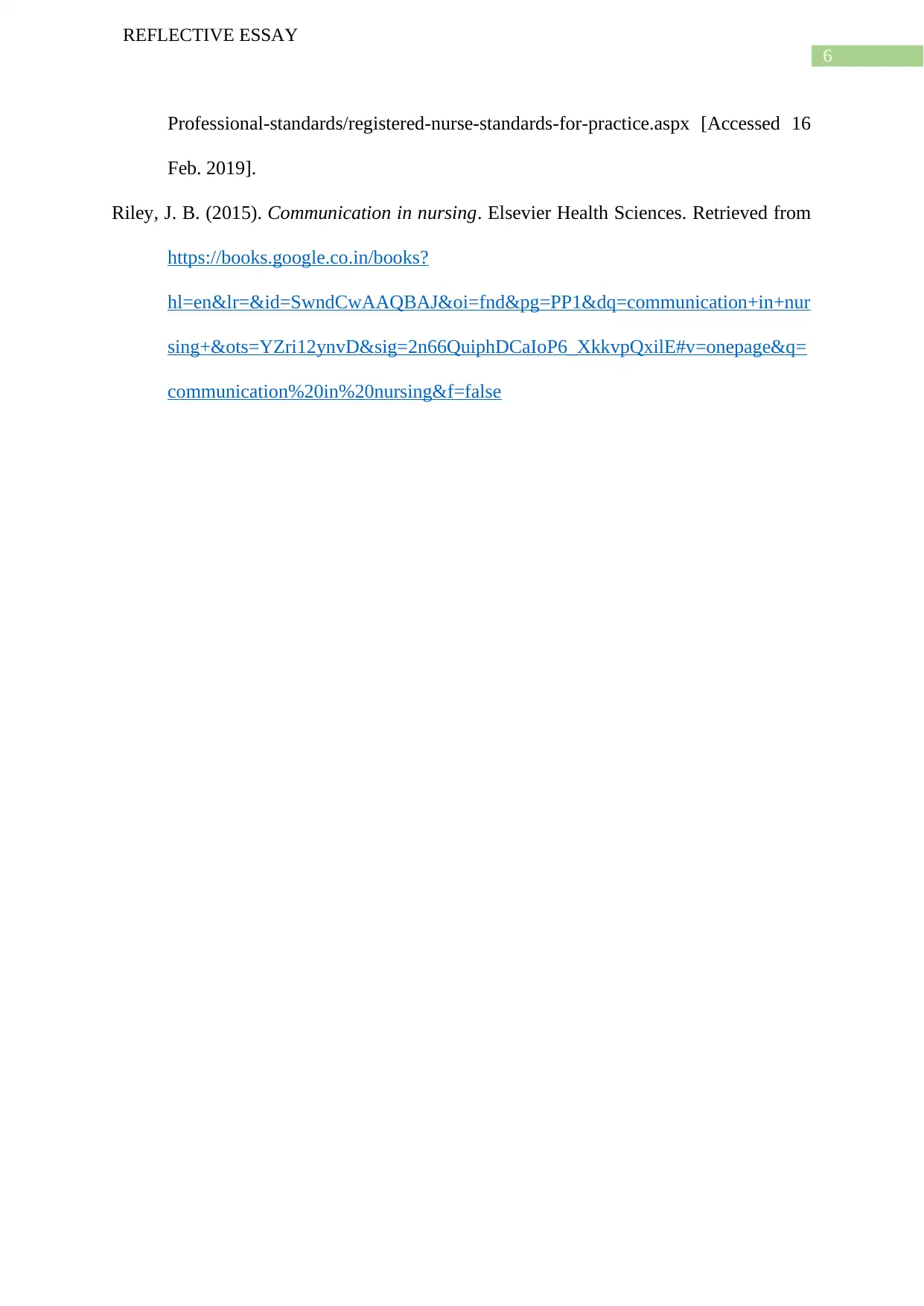
6
REFLECTIVE ESSAY
Professional-standards/registered-nurse-standards-for-practice.aspx [Accessed 16
Feb. 2019].
Riley, J. B. (2015). Communication in nursing. Elsevier Health Sciences. Retrieved from
https://books.google.co.in/books?
hl=en&lr=&id=SwndCwAAQBAJ&oi=fnd&pg=PP1&dq=communication+in+nur
sing+&ots=YZri12ynvD&sig=2n66QuiphDCaIoP6_XkkvpQxilE#v=onepage&q=
communication%20in%20nursing&f=false
REFLECTIVE ESSAY
Professional-standards/registered-nurse-standards-for-practice.aspx [Accessed 16
Feb. 2019].
Riley, J. B. (2015). Communication in nursing. Elsevier Health Sciences. Retrieved from
https://books.google.co.in/books?
hl=en&lr=&id=SwndCwAAQBAJ&oi=fnd&pg=PP1&dq=communication+in+nur
sing+&ots=YZri12ynvD&sig=2n66QuiphDCaIoP6_XkkvpQxilE#v=onepage&q=
communication%20in%20nursing&f=false
1 out of 7
Related Documents
Your All-in-One AI-Powered Toolkit for Academic Success.
+13062052269
info@desklib.com
Available 24*7 on WhatsApp / Email
![[object Object]](/_next/static/media/star-bottom.7253800d.svg)
Unlock your academic potential
Copyright © 2020–2026 A2Z Services. All Rights Reserved. Developed and managed by ZUCOL.





